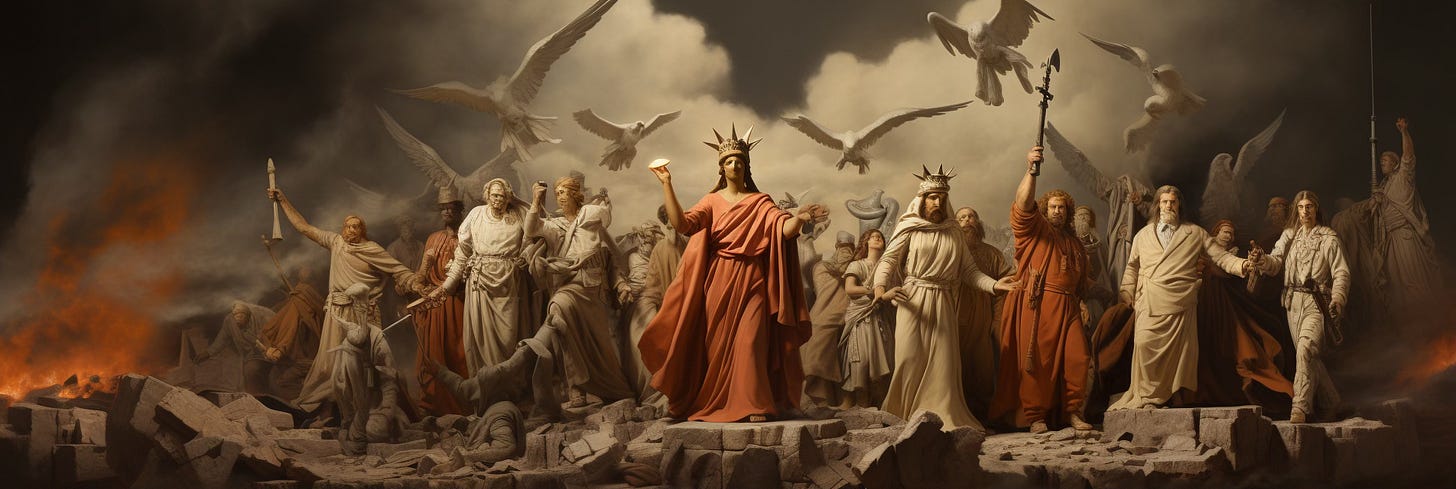In the aftermath of World War II, American Christianity found itself at a crossroads. The triumphant narrative of American exceptionalism, bolstered by victory and emerging global power, created a fertile ground for a new kind of religious-political formation. This was not merely a political alliance, but the beginnings of what would become MAGA Christianism—a theological mutation that would fundamentally reshape how faith intersects with national identity.
A Note on Diversity and Resistance
It is crucial to recognize that MAGA Christianism does not represent the totality of American Christianity. Even as this theological mutation gained power, numerous Christian communities have emerged as vibrant centers of resistance. Black churches, progressive Catholic communities, mainline Protestant denominations, and significant streams within evangelical traditions continue to model alternative forms of Christian witness—communities that reject the fusion of faith with nationalist ideology and instead emphasize love, justice, and genuine discipleship.
The Myth of Christian America
The concept of a "Christian America" is neither new nor monolithic. It represents a complex tapestry of competing narratives about national purpose and divine election. But in the decades following World War II, this mythology took on a particular form that laid the groundwork for our current theological crisis.
The disordered nationalism we've identified as one of the seven theological mutations doesn't emerge from a vacuum. It builds upon decades of civil religious discourse that gradually transformed Christianity from a tradition of prophetic witness to a tool of national self-legitimation.
Theologian Stanley Hauerwas has persistently argued that American Christianity repeatedly mistakes national identity for theological identity. This confusion reaches its apex in MAGA Christianism, where national narrative becomes nearly indistinguishable from divine purpose.
Cold War Theological Formations
The Cold War period proved particularly generative for this theological mutation. Anti-communist rhetoric provided a powerful narrative framework that merged religious conviction with national security. Christianity became less about following Christ and more about defending a particular vision of American freedom—a freedom understood primarily as opposition to a perceived enemy.
This period saw the emergence of what sociologist Robert Bellah termed "civil religion"—a quasi-religious national identity that sacralized American political ideals. Churches increasingly became spaces where patriotism was conflated with spiritual devotion. The line between national loyalty and religious commitment grew blurrier with each passing decade.
Economic Transformations and Religious Identity
The economic shifts of the late 20th century played a crucial role in this theological mutation. As traditional economic structures dissolved—particularly in rural and working-class communities—religious identity became a crucial mechanism for maintaining social cohesion and making sense of economic displacement.
The prosperity materialism we've identified as another theological mutation began to take root. Success became not just an economic marker but a spiritual signifier. The "American Dream" was reimagined as a divine promise rather than a social aspiration, creating a theological framework that justified economic inequality as divine selection.
Media and the Formation of Tribal Epistemology
The emergence of partisan media ecosystems in the late 20th and early 21st centuries accelerated these theological mutations. Conservative Christian media created closed information systems that reinforced existing biases, contributing to what we've identified as tribal epistemology.
These media platforms didn't just report news; they constructed entire interpretive frameworks. Biblical passages were increasingly read through the lens of political ideology rather than theological tradition. This primitive biblicism allowed for a hermeneutic that could simultaneously claim biblical authority while fundamentally distorting biblical meaning.
The Practical Atheism of Political Christianity
Perhaps most significantly, this historical context reveals the emergence of what we've termed practical atheism. Despite maintaining Christian language and symbols, the movement increasingly replaced Jesus as a moral exemplar with political effectiveness as the primary value.
The irony is profound: a movement claiming to defend Christian values became increasingly disconnected from the core teachings of Christ. Pragmatic political goals became the primary driver, with theological language serving merely as a legitimizing discourse.
A Crisis of Discipleship
What emerges from this historical analysis is not a simple story of political manipulation, but a deeper theological crisis. MAGA Christianism represents a fundamental transformation in how Christian identity is understood and performed.
The movement doesn't represent a departure from Christianity, but a mutation—a profound reshaping of religious practice that maintains the appearance of continuity while fundamentally altering the substance of faith.
Looking Forward
Understanding this historical context is crucial. It reveals MAGA Christianism not as a sudden aberration, but as the culmination of long-standing tensions within American Christianity. It shows how theological mutations develop slowly, almost imperceptibly, until they fundamentally reshape religious practice.
In next week's installment, we'll dive deeper into how these historical dynamics manifested in specific theological distortions, exploring how biblical interpretation became a tool for political identity formation rather than a pathway to spiritual transformation.
---
Next Monday: Theological Distortions and Biblical Interpretation



